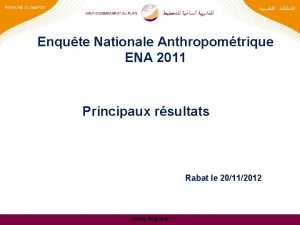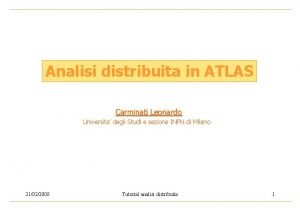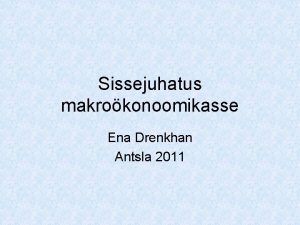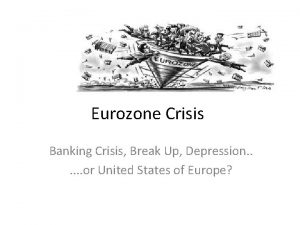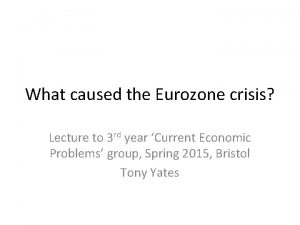ENA 2011 workshop on Eurozone crisis Franco Carminati














- Slides: 14

ENA 2011 workshop on Eurozone crisis Franco Carminati

Why the existing euro? • Miguel : « China has proposed to create a managed floating exchange rate regime”, why not for the euro. • Miguel : “US demands flexible yuan, independent central bank and opening of capital account (China will not accept)”, why has “EU” accepted? • ECB : Cancelled capacity to create money. CB interest rate and of FX rate “independent” from politicians, but dependant from whom?

A/ « Exit » scenario • One or several countries decide to reintroduce domestic currencies and leave the eurozone • What will follow is very uncertain and depends crucially on : ‐ The splitting country’s ability to tame the adverse effects of the exit decision discussion point ‐ The behavior of other countries of the eurozone : * Will other countries leave the eurozone ? * Will other countries & markets retaliate ? Political will and EU project

« Exit » scenario • Copy paste here the Dominique’s chart in blue color

« Exit » scenario – Dominique’s chart Comments on Dominique’s chart: • Some consequences are based on « market laws» such as: * Higher interest rates * Bank runs, capital flows, crisis of national banking system • Debt in exterior currency would increase: this is actually part of the debt negociation process. • Higher (impoted) inflation derived from devaluation does not mean reduced competitiveness.

« Exit » scenario • Benefits to be expected : – Recovery of domestic monetary sovereignty – Ability of the country to devaluate its currency • Costs of exit strategy : – A high risk of monetary & financial crisis see comments – High economic and social costs to be clarified and compared with prevailing situation ‐ € less to loose some importance on International level? ‐ Risk of non coopertaive policies (competitive devaluations, …) • The balance between costs & benefits will depend crucially on the country’s ability to implement radical changes in its policies : – Capital control, price control, control of banks, … – Long term investment in the productive sector …

B/ « Common currency » scenario • Countries of the eurozone agree : – to abandon the euro as a single currency – to adopt a common currency going along with domestic currencies • This new monetary regime would require : – to go beyond the previous system of the ECU – to draw on Keynes’ model of the « bancor » by : * Creating new institutions, i. e. a regional Clearing Union * Adopting new rules for monetary cooperation, fiscal discipline why? , limits on current account disequilibria, …

« Common currency » scenario • The new ECU would be a regional equivalent of SDRs and have three functions : – Unit of account – Complementary means of payment – Intrument of credit among States • The new ECU would be equivalent to the Latin American SUCRE • These new regional monetary systems would lead to a transformation of the international monetary system – based on regionalisation – with new rules & institutions (regional monetary fund)

« Common currency » scenario • Benefits from a common currency : – Domestic monetary sovereignty => more flexibility for economic policies – Regional cooperation based on symmetrical relationships among country members • Costs & risks : – High transition risks when going from the single currency system to the common currency system see discussion on leaving the € – Important reforms needed : will Germany accept ? Democracy problem – Risks of currency war & speculation if the cooperation is not working is cooperation working now? : what rules for fixing exchange rates between the new ECU and the domestic currencies ? There are ways – The new ECU is not a full‐fledged money : only a basket of domestic currencies; will circulate mainly among governments and central banks better than actual situation. And why not using it with, for instance, electronic tools?

C/ « New monetary union » scenario • The euro remains the single currency of the eurozone • Radical reforms are implemented : – Political union is reinforced to foster : * cooperation among country members * democratic control on EU policies by elected bodies and civil society – European fiscal policies are developed with a large European budget (10% of EU GDP) & European taxation & financial transfers within the eurozone, targeting trade balances? – A drastic change in monetary policy and in the role of the ECB : * Democratic control instead of independence of ECB * Coordination of monetary policy & fiscal policiy instead of separation * priority to employment, social and ecological targets => financing of public long term investment by money creation

« New monetary union » scenario • Benefits – The euro will become a powerful factor of integration and cooperation if the reforms are implemented => the risk of segmentation of Europe is reduced – No risk of monetary instability among country members (no currency war, no speculation) – The euro as a means to counter‐balance the power of the dollar & yuan in the world economy • Costs & risks – High political cost for national governments (nationalist political parties) – The euro can benefit to all country members only if neoliberal policies are given up - what chances does this scenarion really have within reasonnable delay?

Points of agreements Conditions for a single currency: • Mundell conditions, hence the following • Same currency would mean similar inflation and similar interest rates. (Different inflation in the US, but more mobility). Conditions of area government in each currency level + Internatioanl: • Lending for productive investment, own housing, etc… but not for speculation purposes. • Democratic institutions to control all aspects of monetary policies : exchange rates, capital flows, money creation, central bank rates. • Democratic institutions to coordinate tax and social issues, trade balance. • Convergence criteria 3%/60% should not be imperative • Capital flow controls between zones with different currencies • SDR instead of $ as international currency • Actual governance not to be confused with government • Debt auditing to possibly cancel illegitimate parts

Discussion points • What would be today IMZ in Europe? • MU first to trigger economic convergence, or economic convergence first? Is there a political will? • Single €, common €, national currencies? Define the EU project! • What room for local currencies? • Is 2% inflation target adequate? • Which strategy? (Menacing) to withdraw? • Conditions for leaving the EZ: reimburse same figures but in devaluated money (which one way to restructure debt)? • Is European bonds a sufficient target?

Aknowledgements • Miguel and Dominique • Lapavitsas, Lordon, and others….

